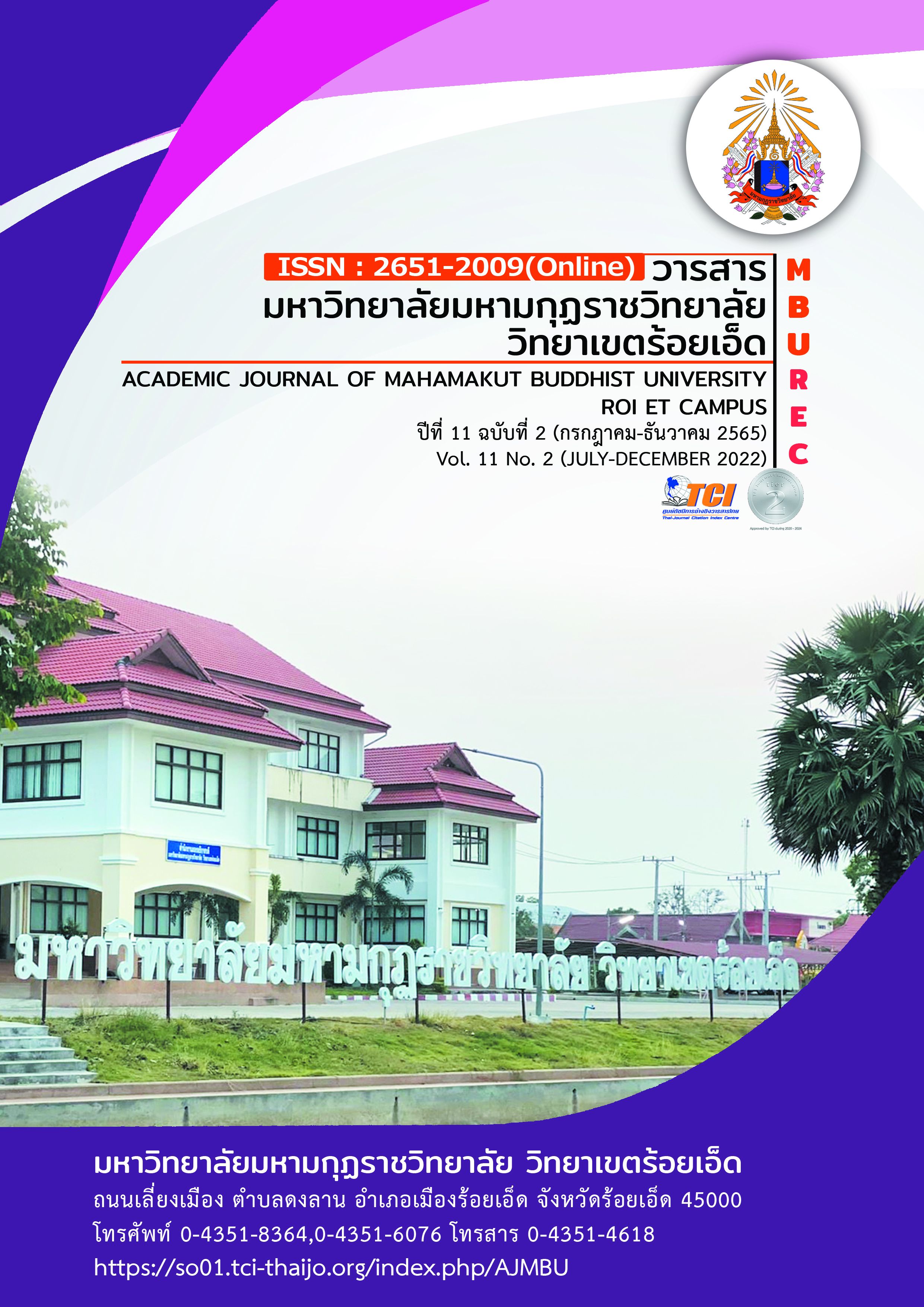AN ANALYSIS STUDY OF KARMA RESULT OF JINN (PETA) ACCORDING TO THE PRINCIPLE OF BUDDHIST ETHICS
Main Article Content
Abstract
The objectives of this research article were 1) to study the Jinn (Peta) and the karma result of the Jinn (Peta) in Buddhism, 2) to study the principles of Buddhist ethics in philosophy and 3) to analyze the karma result of the Jinn (Peta) according to the principle of Buddhist ethics. It is a qualitative research and emphases on documentary research by studying the data from the Thai Tripitaka, Mahamakut Edition, B.E. 2525, about the karma result of the Jinn (Peta) according to Buddhist ethics, commentary, sub-commentary, sub-commentary, pakornvises and according to Buddhist ethics, the research documentaries related to karma result of the Jinn (Peta) related to the rationale and the origin to classify. The research results were presented in a descriptive and analytical form.
The results of research found that: 1. The Jinn (Peta) is one who has done karma before and must receive karma. The Jinn (Peta) is born from people who have done karma in the days of human beings who performed unwholesome karma. After his death he became a beast of hell and suffered. After the expiration of the life from hell, the fraction of unwholesome karma remains. 2. The principle of Buddhist ethics in philosophy found that Buddhist ethics as a science that deals with knowledge systems about behavior according to Buddhist principles are related to 3 levels: knowledge, truth, goodness, it is ethical criteria about philosophical principles, it is the theory of the principles that underlie human conduct, thought, knowledge. 3. The results of the analysis of the karma result of the Jinn (Peta) according to Buddhist ethics. In the beginning, breaking the five precepts will all lead to purgatory in hell whether it is a charity or a charity. This practice of restraining the mind from past karma or life is something that we accumulate from cause and effect. When there is a cause for an action, there is also a consequence of the action.
Article Details

This work is licensed under a Creative Commons Attribution-NonCommercial-NoDerivatives 4.0 International License.
References
ชัยวัฒน์ อัตพัฒน์. (2543). จริยศาสตร์. พิมพ์ครั้งที่ 5. กรุงเทพมหานคร : มหาวิทยาลัยรามคำแหง.
พระพรหมคุณาภรณ์ (ป.อ. ปยุตฺโต). (2550). การพัฒนาที่ยั่งยืน. พิมพ์ครั้งที่ 6. กรุงเทพมหานคร : บริษัท สหธรรมิก จำกัด.
พระพรหมคุณาภรณ์ (ป.อ. ปยุตฺโต). (2551). พจนานุกรมพุทธศาสน์ฉบับประมวลธรรม. พิมพ์ครั้งที่ 12. กรุงเทพมหานคร : โรงพิมพ์มหาจุฬาลงกรณราชวิทยาลัย.
พระมหาไพฑูรย์ สุทฺทวิธุโร. (2536). การวิเคราะห์เชิงปรัชญาเรื่องบาปในพระพุทธศาสนาเถรวาท. วิทยานิพนธ์พุทธศาสตรมหาบัณฑิต สาขาวิชาพุทธศาสนาและปรัชญา. บัณฑิตวิทยาลัย : มหาวิทยาลัยมหาจุฬาลงกรณราชวิทยาลัย.
พระราชวรมุนี (ประยุทธ์ ปยุตฺโต). (2528). (2535). พจนานุกรมพุทธศาสตร์ ฉบับประมวลธรรม. พิมพ์ครั้งที่ 7. กรุงเทพมหานคร : โรงพิมพ์มหาจุฬาลงกรณราชวิทยาลัย.
พระราชวรมุนี (ประยุทธ์ ปยุตฺโต). (2528). รากฐานพุทธจริยศาสตร์ทางสังคมเพื่อสังคมไทยร่วมสมัย. กรุงเทพมหานคร : สำนักพิมพ์เทียนวรรณ.
พระสมคิด สิริปุญโญ (ศรีบุญมา). (2560). วิเคราะห์อกุศลกรรมที่นำสัตว์ไปเกิดเป็นเปรตในพระพุทธศาสนาเถรวาท. วิทยานิพนธ์พุทธศาสตรมหาบัณฑิต สาขาวิชาพระพุทธศาสนา. บัณฑิตวิทยาลัย : มหาวิทยาลัยมหาจุฬาลงกรณราชวิทยาลัย.
มหาวิทยาลัยมหามกุฏราชวิทยาลัย. (2525). พระไตรปิฎกภาษาไทย ฉบับมหามกุฏราชวิทยาลัย พิมพ์เนื่องในวโรกาสครบ 200 ปี แห่งกรุงรัตนโกสินทร์ พุทธศักราช 2525. กรุงเทพมหานคร : มหามกุฏราชวิทยาลัย.
วศิน อินทสระ. (2546). หลักการและการเวียนว่ายตายเกิด. กรุงเทพมหานคร : เรือนธรรม.
เสถียร โกเศศ. (2513). เล่าเรื่องในไตรภูมิ. พิมพ์ครั้งที่ 2. กรุงเทพมหานคร : อมรการพิมพ์.
โสวิทย์ บำรุงภักดิ์. (2560). พุทธจริยศาสตร์. ขอนแก่น : มหาวิทยาลัยมหาจุฬาลงกรณราชวิทยาลัย วิทยาเขตขอนแก่น.


